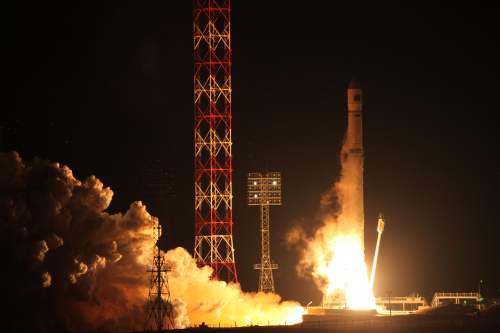MOSCOW (AFP) - Russia on Tuesday said the failure of its Phobos-Grunt probe for Mars could have been caused by radiation from US radars, in its latest allegation of Western interference in its space programme.
"There is such a theory," Yury Koptev the head of the scientific committee of state technology company Russian Technologies told the RIA-Novosti news agency.

"To test (the theory), an equipment block similar to the one on Phobos-Grunt will be exposed to radiation from the possible unintentional exposure to American radars," said Koptev, a former head of Russian space agency Roscosmos.
Roscosmos is currently looking into the possible causes of its latest major space mishap, after the probe, which was launched in November, met an inglorious end Sunday when it crashed back into Earth over the Pacific Ocean.
Deputy Prime Minister Dmitry Rogozin said Tuesday that most of the agency's failures were aftershocks following the industry's dark period of the 1990s, when poor funding could have led to production of faulty equipment.
"If we confirm the fact of a foreign influence on our space equipment over the part of Earth we cannot see, we will come to different conclusions," he told Interfax in apparent reference to the West.
Roscosmos mentioned the possibility of foreign interference last week when the current agency chief Vladimir Popovkin openly asked why its failures often occurred when craft were over the western hemisphere.
"I do not want to blame anyone, but today there are some very powerful countermeasures that can be used against spacecraft whose use we cannot exclude," he told the Izvestia daily on January 10.
Phobos-Grunt was one of the more high-profile mishaps costing $165 million and carrying also a Chinese satellite it was supposed to release in the Mars orbit.
It struck less than three months after an unmanned Progress supply ship bound for the International Space Station crashed into Siberia.
Russia also lost three navigation satellites as well as an advanced military satellite and a telecommunications satellite in the past year.
<한글기사>
美레이더가 러시아 우주선 추락시켰나
정상궤도 진입에 실패하고 발사 후 2개월 여 만에 태평양에 추락한 러시아 화성 위성 탐사선 '포보스-그룬트'호가 미국 레이 더 전파의 영향으로 고장을 일으켰을 가능성이 있다고 현지 유력 일간 신문 '코메르 산트'가 17일 보도했다.
신문은 이날 자국 로켓-우주분야 전문가를 인용해 포보스-그룬트호가 발사 후 초기 시점에 태평양 마셜제도의 '콰잘레인 환초(Kwajalein Atoll)' 지역에 설치된 미국 레이더의 영향권에 들어간 것이 자체 엔진 고장과 정상궤도 진입 실패의 원인 이 됐을 수 있다고 추정했다.
당시 한 소행성의 궤도를 추적하고 있던 미국 레이더의 메가와트급 전파 때문에 탐사선의 전자계기가 고장을 일으키면서 자체 엔진 점화 명령을 내리지 못했을 수 있다는 주장이었다.
우주분야 소식통은 그러나 이같은 가설은 우연히 발생한 일종의 '천재지변적'
상황을 염두에 둔 것으로 미국이 고의로 러시아의 화성 위성 탐사선을 공격했다는 의미는 아니다고 덧붙였다.
이 소식통은 현재 포보스-그룬트 발사 실패 조사위원회가 사고 원인 가운데 하 나로 이같은 가설을 검토하고 있다고 전했다.
애초 조사위원회는 탐사선의 컴퓨터 시스템 작동 이상을 주요 원인으로 검토했 으나 이후 컴퓨터가 태양전지판 전개 명령을 제대로 내린 것을 확인했고, 지금은 탐 사선의 전기 시스템 고장 가능성을 집중적으로 살피고 있다.
동시에 외부 영향에 따른 고장 가능성도 검토되고 있으며 그 가운데 하나로 미 국 레이더 영향설이 검토되고 있다는 것이다.
지난해 11월 9일 카자흐스탄 바이코누르 우주기지에서 로켓 운반체 '제니트-2SB '에 실려 발사된 포보스-그룬트호는 로켓 운반체와 성공적으로 분리됐으나, 이후 자 체 엔진장치가 켜지지 않아 화성으로 향하는 정상궤도에 진입하지 못했다.
이후 지구 중력에 이끌려 지상으로 떨어지던 포보스-그룬트는 15일 오후 9시 45 분(모스크바 시간. 한국시간 16일 오전 2시 45분) 태평양 해역에 추락하고 말았다. (연합뉴스)


















